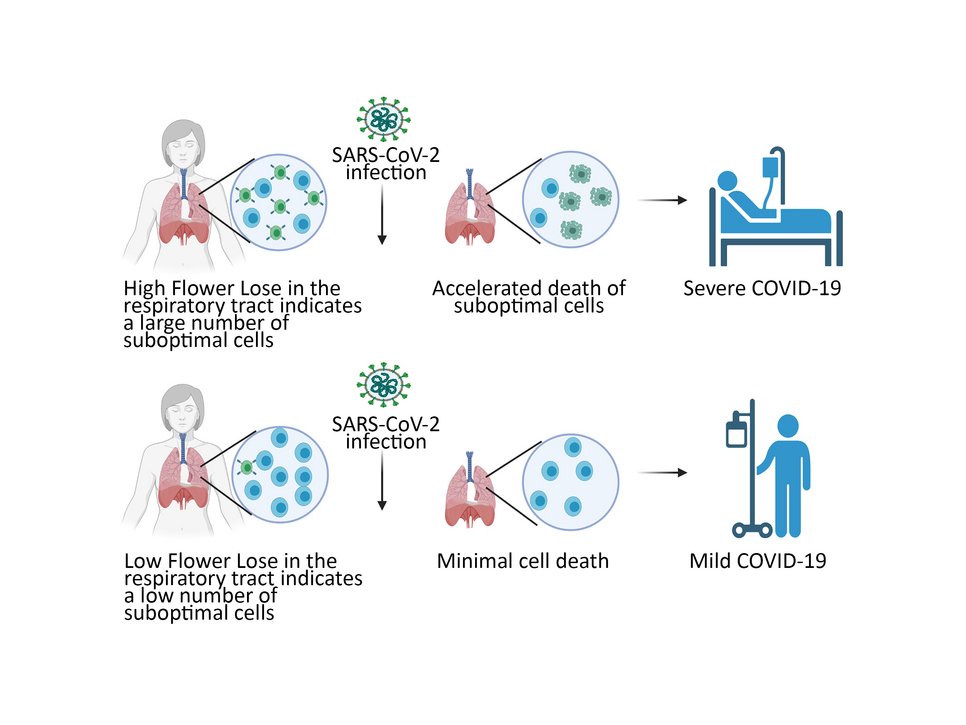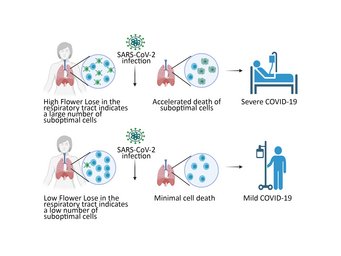Biomarker predicts severity of COVID-19 infection early on
High expression of the "fitness gene hFwe-Lose" in the lung reliably predicts severe progression
Scientists of an international research team with participation of the Max Planck Institute for Heart and Lung Research in Bad Nauheim have identified a biomarker with the gene isoform hFwe-Lose, which indicates the "fitness degree" of lung epithelial cells. In the future, this can be used to predict whether a person can expect a severe course of the disease after a COVID-19 infection.

Many months after the onset of the COVID-19 pandemic, it is still not clear why some patients become very severely ill, sometimes with a fatal course, after SARS-CoV-2 infection, while other patients have only mild symptoms. An international team of researchers led by Rajan Gogna of the University of Copenhagen, together with scientists from the Max Planck Institute for Heart and Lung Research in Bad Nauheim, Germany, have therefore been looking for ways to use biomarkers to predict the course of a SARS-CoV-2 infection.
The scientists found what they were looking for when they analyzed lung tissue samples from patients who had died from COVID-19. "We found that the gene isoform hFwe-Lose was highly expressed in severe COVID-19 progression. This gene is a so-called fitness gene. Cells that are not in an optimal state show high activity of a special expression form of this gene," said Michail Yekelchyk, a postdoc in Thomas Braun's department at the Max Planck Institute in Bad Nauheim and first author of the study. Such isoforms are described as splicing variants.
"We believe that high expression of the hFwe-Lose splicing variant in individual cells that no longer function optimally normally leads to their replacement by healthy cells. Patients with damaged lungs have a large proportion of hFwe-Lose-expressing cells. If many cells express hFwe-Lose and thus no longer function optimally, this natural renewal process no longer works. In the course of an infection, it is precisely these cells that rapidly die. The result is severe lung damage, mainly caused by explosive inflammatory processes," Yekelchyk explains. If the natural renewal process is disturbed because many cells are no longer "fit," a severe course of COVID-19 infection is likely. In this way, hFwe-Lose not only represents a marker for the general fitness of the lung, but also indicates an increased risk of a severe COVID-19 course.
To date, scientists have focused primarily on the immune system for evidence of a severe course of infection. The advantage of monitoring hFwe-lose expression is that this marker provides an indication much earlier, i.e. at the beginning of the infection, whether the patient will become severely ill or even die during the course of the infection.
The scientists were able to prove this by analyzing nasal swabs from around 300 patients. They could predict with a probability of around 90 percent that individual patients would later become seriously ill or die from the COVID-19 infection. The prediction of a less severe course was somewhat less precise. That is, in individual cases, a predicted severe course did not become evident. "Overall, a much better prognosis of an infection course is possible with hFwe-Lose than was previously the case with other biomarkers. One could even use the marker to make a prediction about the course of a COVID-19 disease before the person is even infected," Yekelchyk says.
The scientists hope the study will lead to more targeted treatment of COVID-19 patients. Non-vaccinated patients can be treated more specifically if a severe course is predicted by using the biomarker and thus possibly prevent a severe course. In this way, the proportion of fatal courses could be reduced. In addition, the research team hopes to be able to use hFwe-Lose to predict the course of other diseases, such as influenza, in the future.
The test is not yet clinically or commercially available. The test is not suitable for assessing whether a Covid-19 vaccination is useful. Vaccination against Covid-19 is the method of choice!
